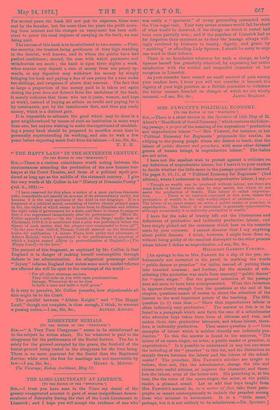MRS. FAWCETT'S POLITICAL ECONOMY.
[TO THE EDITOR OF THE "SPECTATOR.']
SIR,—There is a short review in the Spectator of 10th May of M. About's "Handbook of Social Economy," which contains the follow-
ing passage, a propos of the meaning of the expressions "productive and unproductive labour :"—" Mrs. Fawcett, for instance, in her 'Political Economy for Beginners' propounds the maxim, as edifying to the young people whom she desires to teach, that the labour of public dancers and preachers, with some other debased genera of human beings, is unproductive labour." The italics are not mine.
I have not the smallest wish to protest against a criticism on my definition of unproductive labour, but I leave it to your readers to decide whether the little sneer in the passage quoted is deserved. On pages 9, 10, 11, of "Political Economy for Beginners" (2nd edition), where I endeavour to define unproductive labour, I say,—
" Though no wealth can be produced without labour, yet there are some kinds of labour which may be very useful, but which do not assist the production of wealth. This labour is called unproduc-
tive There is no reproach conveyed in this term, unless the production of wealth is the only worthy object of existence The labour of an opera singer, an actor, a public reader or preacher, is unproductive. The labour of a statesman is generally unproductive, although occasionally it is indirectly productive of wealth."
I have for the sake of brevity left out the illustrations and definitions of productive and indirectly productive labour, and have simply picked out the sentences which bear on the remarks made by your reviewer. I cannot discover that I say anything about public dancers. I think, however, I might have done so, without being guilty of the smallest disrespect to the other perms whose labour I define as unproductive. —I am, Sir, &c., MILLICENT GARRETT FAWCETT.
[An apology is due to Mrs. Fawcett for a slip of the pen, un- fortunately not corrected in the proof, in marking the words "public dancer or preacher" for italics, instead of putting them into inverted commas ; and further, for the mistake of sub- stituting (the quotation was made from memory) "public dancer" for "opera singer." But the general intention of the passage does not seem to have been misrepresented. What this intention is, appears clearly enough from the questions at the end of the chapter, questions meant of course to direct the attention of the learner to the most important points of the teaching. The fifth question (c. 2) runs thus :—" Show that unproductive labour is often indirectly very productive." The answer to this is to be found in a paragraph which sets forth the case of a schoolmaster who educates boys taken from lives of idleness and vice, and makes them into productive labourers, and whose labour, there- fore, is indirectly productive. Then comes question 6 :—" Give examples of labour which is neither directly nor indirectly pro- ductive." To this the answer is found in the sentence, "The labour of an opera singer, an actor, a public reader or preacher, is unproductive." Is it possible to understand in any but one sense the including of the "preacher" in this list, and the distinction so sharply drawn between his labour and the labour of the school- master ? The preacher, Mrs. Fawcett's scholars are taught to believe, does not, like the schoolmaster, change the idle and vicious into useful citizens, or improve the character, and there- fore the labour, even of the better sort. His preaching is, at the best, like the voice of the opera singer, the actor, or the public reader, a pleasant sound. Let us add that boys taught from Mrs. Fawcett's manual do, as a matter of fact, take these para- graphs as meant contemptuously to include the preacher among those who minister to amusement. It is a "little sneer," perhaps, but it is not unlikely to be mischievous.—En. Spectator.]


































 Previous page
Previous page